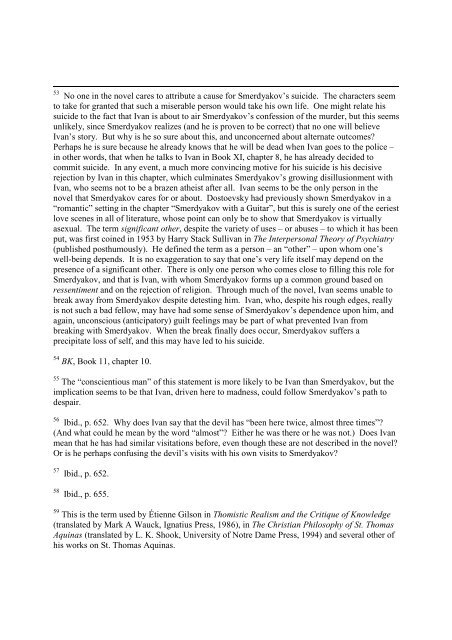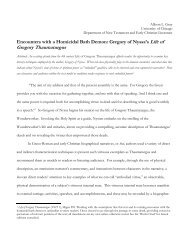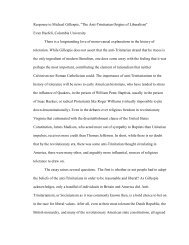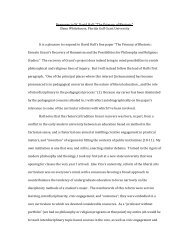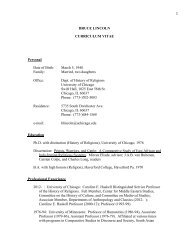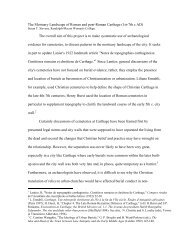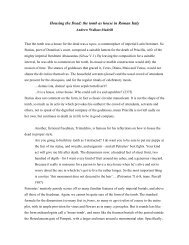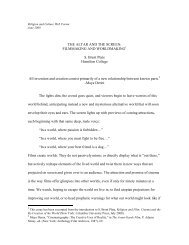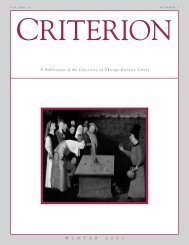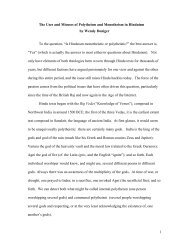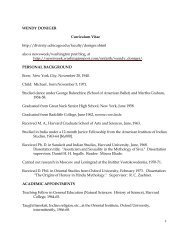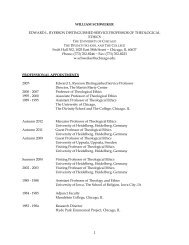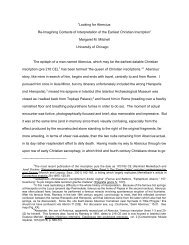The Reification of Evil and The Failure of Theodicy: The Devil in ...
The Reification of Evil and The Failure of Theodicy: The Devil in ...
The Reification of Evil and The Failure of Theodicy: The Devil in ...
Create successful ePaper yourself
Turn your PDF publications into a flip-book with our unique Google optimized e-Paper software.
53 No one <strong>in</strong> the novel cares to attribute a cause for Smerdyakov’s suicide. <strong>The</strong> characters seem<br />
to take for granted that such a miserable person would take his own life. One might relate his<br />
suicide to the fact that Ivan is about to air Smerdyakov’s confession <strong>of</strong> the murder, but this seems<br />
unlikely, s<strong>in</strong>ce Smerdyakov realizes (<strong>and</strong> he is proven to be correct) that no one will believe<br />
Ivan’s story. But why is he so sure about this, <strong>and</strong> unconcerned about alternate outcomes?<br />
Perhaps he is sure because he already knows that he will be dead when Ivan goes to the police –<br />
<strong>in</strong> other words, that when he talks to Ivan <strong>in</strong> Book XI, chapter 8, he has already decided to<br />
commit suicide. In any event, a much more conv<strong>in</strong>c<strong>in</strong>g motive for his suicide is his decisive<br />
rejection by Ivan <strong>in</strong> this chapter, which culm<strong>in</strong>ates Smerdyakov’s grow<strong>in</strong>g disillusionment with<br />
Ivan, who seems not to be a brazen atheist after all. Ivan seems to be the only person <strong>in</strong> the<br />
novel that Smerdyakov cares for or about. Dostoevsky had previously shown Smerdyakov <strong>in</strong> a<br />
“romantic” sett<strong>in</strong>g <strong>in</strong> the chapter “Smerdyakov with a Guitar”, but this is surely one <strong>of</strong> the eeriest<br />
love scenes <strong>in</strong> all <strong>of</strong> literature, whose po<strong>in</strong>t can only be to show that Smerdyakov is virtually<br />
asexual. <strong>The</strong> term significant other, despite the variety <strong>of</strong> uses – or abuses – to which it has been<br />
put, was first co<strong>in</strong>ed <strong>in</strong> 1953 by Harry Stack Sullivan <strong>in</strong> <strong>The</strong> Interpersonal <strong>The</strong>ory <strong>of</strong> Psychiatry<br />
(published posthumously). He def<strong>in</strong>ed the term as a person – an “other” – upon whom one’s<br />
well-be<strong>in</strong>g depends. It is no exaggeration to say that one’s very life itself may depend on the<br />
presence <strong>of</strong> a significant other. <strong>The</strong>re is only one person who comes close to fill<strong>in</strong>g this role for<br />
Smerdyakov, <strong>and</strong> that is Ivan, with whom Smerdyakov forms up a common ground based on<br />
ressentiment <strong>and</strong> on the rejection <strong>of</strong> religion. Through much <strong>of</strong> the novel, Ivan seems unable to<br />
break away from Smerdyakov despite detest<strong>in</strong>g him. Ivan, who, despite his rough edges, really<br />
is not such a bad fellow, may have had some sense <strong>of</strong> Smerdyakov’s dependence upon him, <strong>and</strong><br />
aga<strong>in</strong>, unconscious (anticipatory) guilt feel<strong>in</strong>gs may be part <strong>of</strong> what prevented Ivan from<br />
break<strong>in</strong>g with Smerdyakov. When the break f<strong>in</strong>ally does occur, Smerdyakov suffers a<br />
precipitate loss <strong>of</strong> self, <strong>and</strong> this may have led to his suicide.<br />
54 BK, Book 11, chapter 10.<br />
55 <strong>The</strong> “conscientious man” <strong>of</strong> this statement is more likely to be Ivan than Smerdyakov, but the<br />
implication seems to be that Ivan, driven here to madness, could follow Smerdyakov’s path to<br />
despair.<br />
56 Ibid., p. 652. Why does Ivan say that the devil has “been here twice, almost three times”?<br />
(And what could he mean by the word “almost”? Either he was there or he was not.) Does Ivan<br />
mean that he has had similar visitations before, even though these are not described <strong>in</strong> the novel?<br />
Or is he perhaps confus<strong>in</strong>g the devil’s visits with his own visits to Smerdyakov?<br />
57 Ibid., p. 652.<br />
58 Ibid., p. 655.<br />
59 This is the term used by Étienne Gilson <strong>in</strong> Thomistic Realism <strong>and</strong> the Critique <strong>of</strong> Knowledge<br />
(translated by Mark A Wauck, Ignatius Press, 1986), <strong>in</strong> <strong>The</strong> Christian Philosophy <strong>of</strong> St. Thomas<br />
Aqu<strong>in</strong>as (translated by L. K. Shook, University <strong>of</strong> Notre Dame Press, 1994) <strong>and</strong> several other <strong>of</strong><br />
his works on St. Thomas Aqu<strong>in</strong>as.


